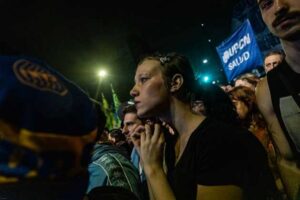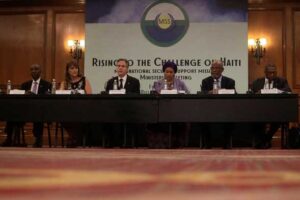
Civil Society, Crime & Justice, Editors’ Choice, Headlines, Human Rights, Indigenous Rights, Latin America & the Caribbean, Sustainable Development Goals

Members of the indigenous guard of the native community of Puerto Nuevo, of the Amazonian Kakataibo people, located in the central-eastern jungle of Peru. Credit: Courtesy of Marcelo Odicio
– The invasion of lands inhabited by Amazon indigenous communities is growing in Peru, due to drug trafficking mafias that are expanding coca crops to produce and export cocaine, while deforestation and insecurity for the native populations and their advocates are increasing
“Drug trafficking is not a myth or something new in this area, and we are the ones who defend our right to live in peace in our land,” said Kakataibo indigenous leader Marcelo Odicio, from the municipality of Aguaytía, capital of the province of Padre Abad, in the Amazonian department of Ucayali.
“We are the ones who pay the consequences, we are visible to criminals, we are branded as informers, but I will continue to defend our rights. Along with the indigenous guard we will ensure that the autonomy of our territory is respected,” Marcelo Odicio.
Of the 33 million inhabitants of the South American country, around 800,000 belong to 51 Amazonian indigenous peoples. Overall, 96.4% of the indigenous population is Quechua and Aymara, six million of whom live in the Andean areas, while the Amazonian jungle peoples account for the remaining 3.6%.
The Peruvian government is constantly criticised for failing to meet the needs and demands of this population, who suffer multiple disadvantages in health, education, income generation and access to opportunities, as well as the growing impact of drug trafficking, illegal logging and mining.
A clear example of this is the situation of the Kakataibo people in two of their native communities, Puerto Nuevo and Sinchi Roca, in the border between the departments of Huánuco and Ucayali, in the central-eastern Peruvian jungle region.
For years they have been reporting and resisting the presence of invaders who cut down the forests for illegal purposes, while the government pays no heed and takes no action.
The most recent threat has led them to deploy their indigenous guard to defend themselves against new groups of outsiders who, through videos, have proclaimed their decision to occupy the territories over which the Kakataibo people have ancestral rights, which are backed by titles granted by the departmental authorities.
Six Kakataibo leaders who defended their lands and way of life were murdered in recent years. The latest was Mariano Isacama, whose body was found by the indigenous guard on Sunday 14 July after being missing for weeks.
In his interview with IPS, Odicio, president of the Native Federation of Kakataibo Communities (Fenacoka), lamented the authorities’ failure to find Isacama. The leader from the native community of Puerto Azul had been threatened by people linked to drug trafficking, suspects the federation.

Marcelo Odicio, president of the Native Federation of Kakataibo Communities, headquartered in the town of Aguaytía, in the department of Ucayal, in the Peruvian Amazon. Credit: Inforegión
During a press conference in Lima on 17 July, the Interethnic Association for the Development of the Peruvian Jungle (Aidesep), that brings together 109 federations representing 2,439 native communities, deplored the government’s indifference in the situation of the disappeared and murdered leader, which brings to 35 the number of Amazonian indigenous people murdered between 2023 and 2024.
Aidesep declared the territory of the Amazonian indigenous peoples under emergency and called for self-defence and protection mechanisms against what they called “unpunished violence unleashed by drug trafficking, mining and illegal logging under the protection of authorities complicit in neglect, inaction and corruption.”
Lack of vision for the Amazon
The province of Aguaytía, where the municipality of Padre de Abad is located and where the Kakataibo live, among other indigenous peoples, will account for 4.3% of the area under coca leaf cultivation by 2023, around 4,019 hectares, according to the latest report by the government’s National Commission for Development and Life without Drugs (Devida).
It is the sixth largest production area of this crop in the country.
The report highlights that Peru reduced illicit coca crops by just over 2% between 2022 and 2023, from 95,008 to 92,784 hectares, thus halting the trend of permanent expansion over the last seven years.
These figures are called into question by Ricardo Soberón, an expert on drug policy, security and Amazonia.

Ricardo Soberón, a renowned Peruvian expert on drug policy, Amazonia and security. Credit: Walter Hupiú / IPS
“The latest World Drug Report indicates that we have gone from 22 to 23 million cocaine users, and that the golden triangle in Burma, the triple border of Argentina-Paraguay-Brazil and the Amazonian trapezoid are privileged areas for production and export,” Soberón told IPS.
The latter holds “Putumayo and Yaguas, areas that according to Devida have reduced the 2,000 hectares under cultivation. I don’t believe it,” he said.
The United Nations Office on Drugs and Crime (UNODC), that commissioned the report, also lists Peru as the world’s second largest cocaine producer.
Soberón added another element that discredits the conclusions of the Devida report: the government’s behaviour.
“There is no air interdiction in the Amazonian trapezoid, the non-lethal interdiction agreement with the United States will be operational in 2025. On the other hand, there are complaints against the anti-drug police in Loreto, the department where Putumayo and Yaguas are located, for their links with Brazilian mafias,” he explained.
He believes there was an attempt to whitewash “a government that is completely isolated”, referring to the administration led since December 2022 by interim president Dina Boluarte, with minimal levels of approval and questioned over a series of democratic setbacks.
Soberón, director of Devida in 2011-2012 and 2021-2022, has constantly warned that the government, at different levels, has not incorporated the indigenous agenda in its policies against illegalities in their ancestral areas.
This, he said, despite the growing pressure on their peoples and lands from “the largest illegal extractive economies in the world: drug trafficking, logging and gold mining,” the main causes of deforestation, loss of biodiversity and territorial dispossession.
Soberón argued that, given the magnitude of cocaine trafficking in the world, major trafficking groups need coca crop reserves, and Peruvian territory is fit for it. He deplored the minimal strategic vision among political, economic, commercial and social players in the Amazon.
Based on previous research, he says that the Cauca-Nariño bridge in southern Colombia, Putumayo in Peru, and parts of Brazil, form the Amazonian trapezoid: a fluid transit area not only for cocaine, but also for arms, supplies and gold.
Hence the great flow of cocaine in the area, for trafficking and distribution to the United States and other markets, which makes the jungle-like indigenous territories of the Peruvian Amazon attractive for coca crops and cocaine laboratories.
Soberón stresses it is possible to reconcile anti-drug policy with the protection of the Amazon, for example by promoting the citizen social pacts that he himself developed as a pilot project during his term in office.
It is a matter, he said, of turning the social players, such as the indigenous peoples, into decision-makers. But this requires a clear political will, which is not seen in the current Devida administration.

Mariano Isacama (left), a Kakataibo indigenous leader who disappeared and was murdered after allegedly receiving threats from people linked to drug traffickers. Next to him, the president of the indigenous organisation Orau, Magno López. Credit: Courtesy of Marcelo Odicio
“We will not stand idly by”
Odicio, the president of Fenacoka, knows that the increased presence of invaders in their territories is aimed at planting pasture and coca leaf, an activity that destroys their forests. They have even installed maceration ponds near the communities.
When invaders arrive, they cut down the trees, burn them, raise cattle, take possession of the land and then demand the right to title, he explained. “After the anti-forestry law, they feel strong and say they have a right to the land, when it is not the case,” he said.
He refers to the reform of the Forestry and Wildlife Act No. 29763, in force since December 2023, which further weakens the security of indigenous peoples over their land rights and opens the door to legal and illegal extractive activities.
The leader, who has a wife and two young children, knows that the role of defender exposes him. “We are the ones who pay the consequences, we are visible to criminals, we are branded as informers, but I will continue to defend our rights. Along with the indigenous guard we will ensure that the autonomy of our territory is respected,” he stressed.
In the native community of Puerto Nuevo there are 200 Kakataibo families, with 500 more in Sinchi Roca. They live from the sustainable use of their forest resources, who are at risk from illegal activities. “We just want to live in peace, but we will defend ourselves because we cannot stand idly by if they do not respect our autonomy”, he said.


 In June, thousands of women took to the streets of São Paulo and other cities to protest against a bill that would classify abortion after 22 weeks as homicide, punishable by six to 20 years in prison. Protests began when the lower house of Congress fast-tracked the bill, limiting debate. Abortion is currently legal in Brazil only in cases of rape, foetal malformation or danger to the life of a pregnant person. The proposed bill, promoted by evangelical representatives, would criminalise people who have abortions more severely than rapists. Public reaction has slowed down the bill’s progress and its future is now uncertain.
In June, thousands of women took to the streets of São Paulo and other cities to protest against a bill that would classify abortion after 22 weeks as homicide, punishable by six to 20 years in prison. Protests began when the lower house of Congress fast-tracked the bill, limiting debate. Abortion is currently legal in Brazil only in cases of rape, foetal malformation or danger to the life of a pregnant person. The proposed bill, promoted by evangelical representatives, would criminalise people who have abortions more severely than rapists. Public reaction has slowed down the bill’s progress and its future is now uncertain.











